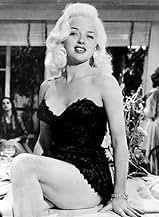Really, almost a warmup to the Strouse-Adams stage musical of five years later, in that it's about a teen-idol singer (a crooner here, rock and roll being just on the horizon) who invades an upper-middle-class suburban home, antagonizes the paterfamilias, enthralls his impressionable teenage daughter, and generally charms the women of the neighborhood. As the dad, Jack Buchanan mainly purses his lips and inserts nasal insults into the proceedings; he's nowhere near as broad as Paul Lynde, nor as funny. (But then, his lines are unusually feeble.) And he only gets one brief dance, near the end, and a smattering of vocals. David Hurst, as a cartoonish German shrink studying the effects of a teen heartthrob on the bourgeoisie, is just unforgivably bad. It's not all his fault: J. Lee Thompson, as he did years later with "What a Way to Go!", overemphasizes everything and hammers the comedy into the ground. Jerry Wayne, as the Conrad Birdie of the piece, sings some Johnnie Ray-type ballads with the right sobbing style. And Jeannie Carson, as another of Buchanan's girls, is the best thing in the picture, pretty and spirited and talented, even in an overproduced musical sequence that hasn't much to do with anything. There's also Diana Dors, the camera lingering lovingly on her cleavage, as a good-time party girl. None of it makes sense, the subplots are unrelated to each other, and there's no payoff, but as a chronicle of how the British tried to adopt American pop-culture customs even as they were satirizing them, it's kind of fascinating.


































